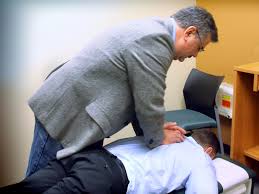Why does my back hurt worse after going to the chiropractor?
Nothing is more debilitating than having a back that’s out of whack. From picking up your child to bending over and grabbing the newspaper, your back is integral to everything that you do. A sore back just makes life harder! The natural solution to curing a back that isn’t feeling quite up to par is to visit a quality chiropractor. What if you use that correct logic but after your adjustment, your back still hurts just as much, if not more?
This could include:Pain after getting a chiropractic adjustment
- Significant soreness
- Difficulty with overall movement
- Pain sufficient enough to deter otherwise easy daily tasks
Chiropractic Goals and Possible Effects
Should patients feel more pain in your back after receiving chiropractic care? When it comes to the spine, and back specifically, the goal of a successful chiropractic session is to eradicate inflammation and reduce overall pain. The areas of relief mainly focus on joints, ligaments, and muscles.
The intention is to achieve this well-being through the use of:
- Massaging
- Ultrasound
- Electrical stimulation
- Spinal manipulation
It’s important to note that common side effects of chiropractic adjustments are tiredness, minor headaches, and slight discomfort in adjusted locations. Your body may be used to being out of alignment. So, when your spine is back in alignment, it will take some getting used to, which may cause you to feel sore. So what else has occurred to hinder the success of your chiropractic visit and leave you in a significant amount of pain?
Two Main Reasons for an Increase in Back Pain After Visiting the Chiropractor
1. Disc Herniation
If the annulus fibrosus, basically the tough, outer layer of your discs that compose your spine, is torn or stretched too far you have a disc herniation. Once the annulus fibrosus has torn the softer, interior part of the disc can seep out and negatively affect surrounding nerves. There are multiple common names for a disc herniation that may be more familiar, such as a pinched nerve or slipped disc.
Symptoms of a disc herniation can create pain and numbness that you may actually feel more in areas surrounding your back like neck or legs, however, the root of the problem is located in your lower back. Important note: a disc herniation is not caused by getting a chiropractic adjustment. Common causes that lead to a herniated disc are repetitive lifting, improper lifting techniques, and contact sports. Also, it is believed that when informed of the herniated disc your chiropractor is able to create an individualized treatment using heat and ice therapy and manipulation to reduce pain and discomfort.
However, if you or your chiropractor were unaware of the pinched nerve, during a massage or other spinal manipulation technique it is likely the disc herniation was heavily aggravated. This could easily lead to aches and pains that affect more than just your back. What if it is less serious, despite still being an unpleasant pain, than a herniated disc?
2. Irritated Ligaments and Muscles
Remember, the focus and goal of a chiropractor is to heal painful joints, muscles, and ligaments with noninvasive methods. Through massage and manipulation of the spine, chiropractors try to realign and straighten your body and alleviate curvature imbalances.
The problem arises when the chiropractor attempts to perfectly straighten the spine and meets heavy resistance from your body. Once a person has reached adulthood, it is very likely that any sort of curvature that has developed over time is as good as permanent.
Hurt worse after seeing the chiropractor
At this point, even the greatest of efforts provided by your chiropractor will bring minimal long-lasting results without the use of passive traction devices like these. What is happening in return is your muscles and ligaments are being shifted in ways that have become unnatural, despite being considered “aligned.” This could result in greater pain than initially described or even pain in areas of the body that had otherwise felt perfectly fine.

Chiropractors Explain Soreness After Adjustments
After a spinal adjustment, you may have some soreness or achiness. This is a normal part of the process and should go away over time, usually a very short period. Chiropractors explain that many patients feel soreness, and it is not an indication of a bigger problem.
Soreness
Soreness is a normal side effect after a spinal adjustment. Some people experience minor aches in the parts of the body that are adjusted. In general, chiropractors try to use a gentle approach to treat alignment problems. However, any type of alignment can create some aches. Previous injuries, past traumas and other things can affect a person’s reaction to treatment. You may feel soreness in the muscles and joints.
Time
Usually, the soreness does not last more than 24 hours. Some patients share that their soreness goes away faster and only lasts a couple of hours after an adjustment. Chiropractors explain that regular treatments may decrease the soreness completely. This means that you have some soreness after the first spinal adjustment but seeing a chiropractor regularly can reduce it.
Safety
Chiropractic visits are safe and not invasive. There are no needles, surgeries or medications involved in the process. Chiropractors point out that having some soreness after an adjustment is a normal part of the treatment process and not a major concern.
Heat and Ice
Your chiropractor may recommend using an ice pack or heat source after an adjustment. This may decrease soreness and aches. Make sure to talk to the chiropractor before using a home remedy. Chiropractors have specific reasons for suggesting certain home treatment options, and it is important to follow their advice.

Why am I sore a couple days after an adjustment?
The reason you are only sore for a day or two is because your body starts fixing the problem. Have you noticed that you may be sore after the adjustment, but then two days later you feel ten times better than you did the first day you came in? Two things happen:
- Your muscles start gaining muscle memory of the new position of the joint. Getting regular adjustments helps keep your muscles toned, and helps remind the muscles how they are supposed to hold the joint in place.
- Your bones actually start laying down new bone. Wolf’s law is a theory developed by the German anatomist and surgeon Julius Wolff (1836–1902) in the 19th century that states that bone in a healthy person or animal will adapt to the loads under which it is placed.” When you get a chiropractic adjustment your chiropractor puts pressure on the bones of the joint, and the joint adapts and changes.
Not every patient has pain after a chiropractic adjustment. There are many variables and factors that contribute to pain after an adjustment, for instance how lax or taut your ligaments, tendons, and muscles around the joint are. If you have decreased range of motion due to tight muscles you may experience more stiffness and soreness after a chiropractic adjustment.

Can a Chiropractor Hurt Your Back?
Chiropractic therapies, often known as spinal manipulation, involve the application of pressure in a manner that relieves back pain and makes your spine and the whole back feel more comfortable. Besides these and many other benefits that come with spinal manipulation, it also has its own risks, among them being spinal injuries. A chiropractor can hurt your back because of several reasons. This article looks at some instances when a chiropractor can hurt your back.
A Quack
Although they rarely do occur, accidents and risks are possible from a chiropractic therapy. These isolated cases occur when a patient falls into the wrong hands of unqualified and uncertified chiropractors. These are very dangerous since they do not know how much pressure they should apply or what techniques they should use in performing the therapy. To avoid this, you should always ensure that you check a chiropractor’s qualification and certification before allowing them to work on you.
Repeat Treatment
Sometimes cases occur where a patient gets their backs hurt by one chiropractor by using the wrong method or too much force. In case this happens, many people tend to make the mistake of looking for a different chiropractor to correct the problem. This is wrong because a different chiropractor only hurts your back even more. To avoid making this mistake, you should see an orthopedist immediately.
Too Much Force
Another mistake that inexperienced and under-qualified chiropractors make is to use so much force than necessary without remembering that the back contains a delicate spinal cord that should be handled with utmost care. A good chiropractor uses moderate force to manipulate the spine and if too much of it is used, it will instead worsen the condition.
How Chiropractors Help with Upper Back Pain
There are a few different ways chiropractors can help with upper back pain. Chiropractors typically use spinal manipulation or other unique therapies that help the spine and your musculoskeletal structure get back to its proper alignment. The goal is to let the body heal itself, so there is not a need for medications and surgeries.
Chiropractors will manipulate certain areas of the upper back so the mobility in the affected area improves. It involves the joints and tissues in the back that have been affected due to a variety of issues like:
- Injury
- Falling
- Repetitive stress
- Improper posture
When you see a chiropractor for upper back pain they will focus their main goal on relieving pain in any of the bones, muscles, joints, ligaments, tendons, and cartilage around the area. Your chiropractor will go over your medical history with you and do a physical exam to help hone in on the affected area and how to best treat your specific condition.


